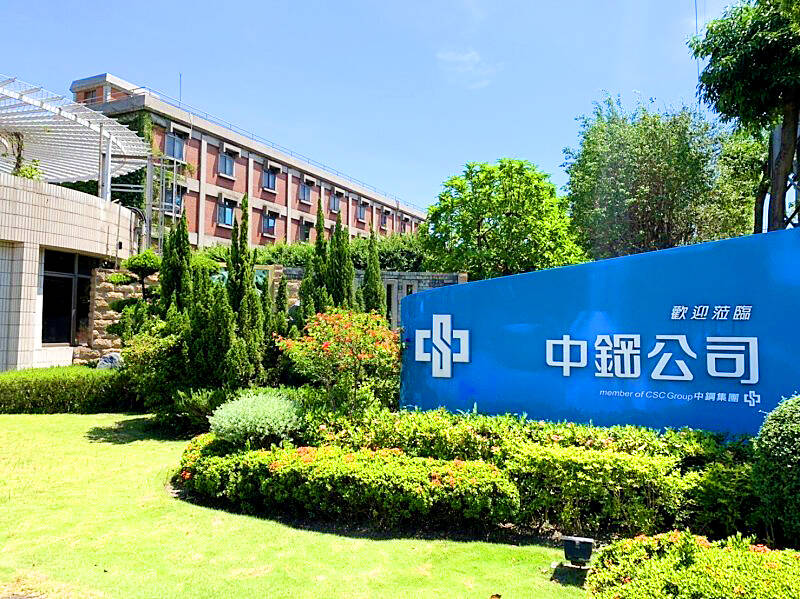China Steel Corp (CSC, 中鋼), the nation’s biggest steelmaker, yesterday hiked domestic steel prices by at least NT$500 per tonne for deliveries next month and next quarter as global steel prices rise amid a widening trade war.
Steel prices in the US have surged about 30 percent to surpass the key US$1,000 per tonne level since US President Donald Trump last month threatened to impose higher tariffs on all aluminum and steel imports, CSC said in a statement.
Trump early this month exercised his authority under Section 232 of the US Trade Expansion Act of 1962 to slap a 25 percent tariff on steel imports, citing national security concerns.

Photo courtesy of China Steel Corp
Prices in Europe are also on the rise, with the EU saying it would launch retaliatory countermeasures on US goods from April 1, CSC said.
The EU has proposed to cut duty-free hot-rolled coil safeguard quotas for major importers and to extend the coverage to include more items, it said.
“Considering the favorable market sentiment for an uptrend and the uneven impact of new US tariffs on downstream industries, CSC is hiking prices for some products and holding on others for April and second-quarter deliveries,” the statement said.
Taiwanese firms have long faced a 25 percent levy on steel exports to the US, so the new tariff scheme places local steelmakers on equal footing with foreign rivals, it added.
China’s push for structural reform and green manufacturing is helping to mitigate overcapacity in China, which also bodes well for overall market sentiment, it said.
In their latest quotes, China’s Baowu Steel Group Corp (寶武鋼鐵集), the world’s largest steelmaker, and Angang Steel Co (鞍本鋼鐵) announced they would hold prices steady for delivery next month, while Formosa Ha Tinh Steel Corp (台塑河靜鋼鐵興業) in Vietnam hiked prices by US$20 per tonne.
Under the latest price adjustments, prices of hot-rolled steel coils and plates, and cold-rolled steel coils are to rise by NT$500 per tonne for domestic deliveries next month, CSC said.
Hot-rolled plates are typically used in house and bridge building, while cold-rolled steel plates are usually used in vehicle manufacturing.
Prices of hot-rolled coils of rerolling quality would go up by NT$600 per tonne next month, CSC said.
Prices of electro-galvanized steel coils, galvanized steel coils and electrical steel coils are to remain unchanged, it said.
For the second quarter, prices of steel bars and rods are to increase by NT$600 per tonne, while hot-rolled plates and coils, as well as cold-rolled coils used in carbon steel and tool steel are to rise NT$500 per tonne, the company said.

SELL-OFF: Investors expect tariff-driven volatility as the local boarse reopens today, while analysts say government support and solid fundamentals would steady sentiment Local investors are bracing for a sharp market downturn today as the nation’s financial markets resume trading following a two-day closure for national holidays before the weekend, with sentiment rattled by US President Donald Trump’s sweeping tariff announcement. Trump’s unveiling of new “reciprocal tariffs” on Wednesday triggered a sell-off in global markets, with the FTSE Taiwan Index Futures — a benchmark for Taiwanese equities traded in Singapore — tumbling 9.2 percent over the past two sessions. Meanwhile, the American depositary receipts (ADRs) of Taiwan Semiconductor Manufacturing Co (TSMC, 台積電), the most heavily weighted stock on the TAIEX, plunged 13.8 percent in

A wave of stop-loss selling and panic selling hit Taiwan's stock market at its opening today, with the weighted index plunging 2,086 points — a drop of more than 9.7 percent — marking the largest intraday point and percentage loss on record. The index bottomed out at 19,212.02, while futures were locked limit-down, with more than 1,000 stocks hitting their daily drop limit. Three heavyweight stocks — Taiwan Semiconductor Manufacturing Co (TSMC, 台積電), Hon Hai Precision Industry Co (Foxconn, 鴻海精密) and MediaTek (聯發科) — hit their limit-down prices as soon as the market opened, falling to NT$848 (US$25.54), NT$138.5 and NT$1,295 respectively. TSMC's

TARIFFS: The global ‘panic atmosphere remains strong,’ and foreign investors have continued to sell their holdings since the start of the year, the Ministry of Finance said The government yesterday authorized the activation of its NT$500 billion (US$15.15 billion) National Stabilization Fund (NSF) to prop up the local stock market after two days of sharp falls in reaction to US President Donald Trump’s new import tariffs. The Ministry of Finance said in a statement after the market close that the steering committee of the fund had been given the go-ahead to intervene in the market to bolster Taiwanese shares in a time of crisis. The fund has been authorized to use its assets “to carry out market stabilization tasks as appropriate to maintain the stability of Taiwan’s

STEEP DECLINE: Yesterday’s drop was the third-steepest in its history, the steepest being Monday’s drop in the wake of the tariff announcement on Wednesday last week Taiwanese stocks continued their heavy sell-off yesterday, as concerns over US tariffs and unwinding of leveraged bets weighed on the market. The benchmark TAIEX plunged 1,068.19 points, or 5.79 percent, to 17,391.76, notching the biggest drop among Asian peers as it hit a 15-month low. The decline came even after the government on late Tuesday authorized the NT$500 billion (US$15.2 billion) National Stabilization Fund (國安基金) to step in to buoy the market amid investors’ worries over tariffs imposed by US President Donald Trump. Yesterday’s decline was the third-steepest in its history, trailing only the declines of 2,065.87 points on Monday and